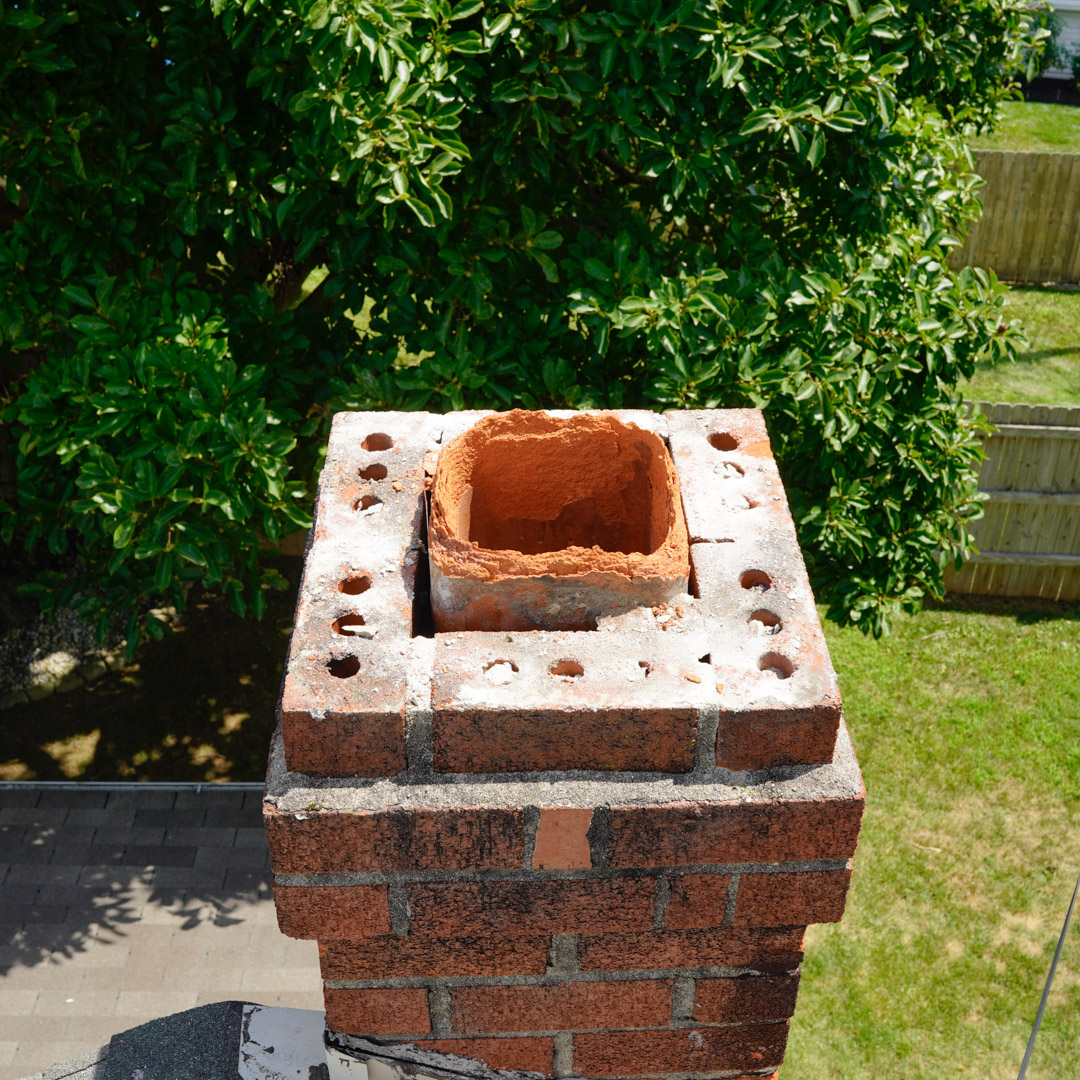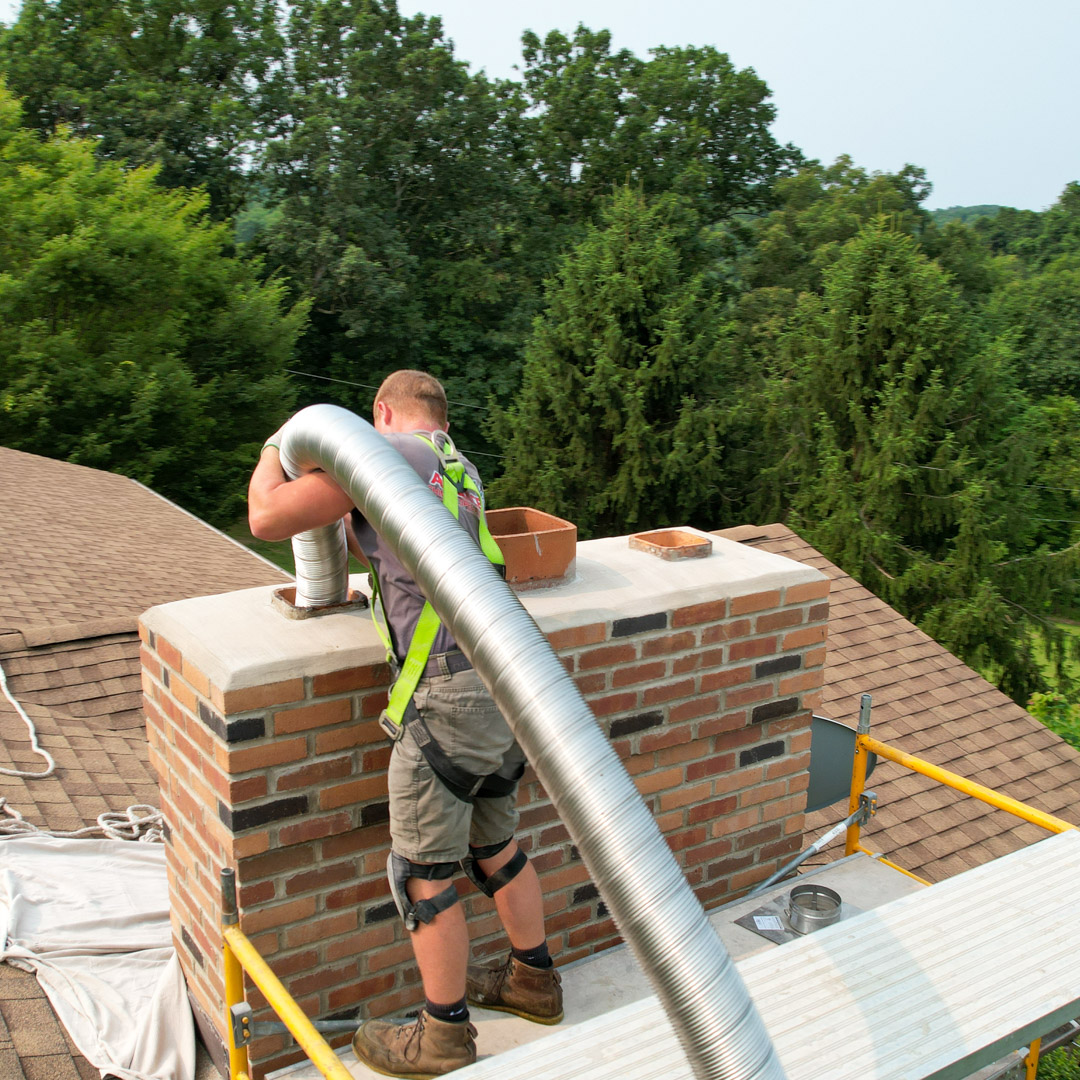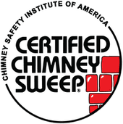Why Chimney Flue Tiles Crack
Southwestern Pennsylvania experiences all four seasons, from humid summers with temperatures reaching into the 80s and 90s to cold, snowy winters that dip below freezing. The region’s climate stresses homes and their components, including chimneys. This constant cycle of freezing and thawing and other contributing factors can accelerate the deterioration of chimney flue tiles, leading to cracks and potential hazards.
 Why Do Flue Tiles Crack?
Why Do Flue Tiles Crack?
Cracks in flue tiles pose a serious risk, potentially allowing dangerous gases like carbon monoxide to leak into your home. Carbon monoxide is a colorless, odorless gas that can cause sudden illness or death. As this protective covering deteriorates, heat can transfer to combustible materials, leading to a devastating house fire. Chimney fires, caused by creosote buildup, generate exceptionally high temperatures that can severely damage flue tiles, causing them to crack, blister, and even burst. Several factors contribute to this, including:
- Thermal Shock: The main reason chimney flue tiles crack is thermal shock. Rapid temperature fluctuations, such as when a hot fire starts in a cold chimney, can cause the tiles to expand and contract quickly. This stress leads to cracking. Think of it like pouring hot water into a cold glass – the rapid pressure change in temperature can cause the glass to break. The same principle applies to flue tiles.
- Moisture: Water infiltration is another significant problem that causes cracked tiles. Rain, snow, and condensation can weaken the terra cotta material. When this moisture freezes and thaws, it expands and contracts, putting additional pressure on the liner and causing it to crack.
- Foundation Settling: Over time, the house itself will settle. You may notice cracks in your walkways, driveway, and garage floor, especially if you reside in an older home. This settling can stress the entire chimney structure, resulting in cracks in the flue tiles, among other damage.
- Age and Wear: Flue tiles, like many materials, deteriorate with age. Constant exposure to heat, acidic byproducts, and the elements eventually become too much to bear, weakening the tiles and making them more susceptible to cracking.
- Improper Installation: If the flue tiles were not installed (or repaired) correctly, they are more likely to crack. Gaps between tiles or inadequate support can create weak points, increasing the fire risk and exposure to toxic carbon monoxide fumes.
- Chimney Fires: Chimney fires, caused by creosote buildup, generate exceptionally high temperatures that can severely damage flue tiles, causing them to crack, blister, and even burst.
Signs Your Flue Tiles Are Cracking
While a professional inspection with a video scan is the most reliable way to check for cracks in the liner, there are some telltale signs Pennsylvania homeowners can watch for:
- A sudden increase in the draft of your fireplace.
- Difficulty lighting a fire.
- Bits of tile or mortar debris in the firebox or at the base of the chimney.
- Smoky odor, even when the fireplace isn’t in use.
- Cracks on the exterior of your chimney.
- Creosote buildup.
If you observe any of these signs, contacting a chimney professional is crucial.
How to Fix Cracked Flue Liner Tiles
Addressing cracked flue tiles is vital. Ignoring the problem can lead to serious consequences, including carbon monoxide poisoning and house fires. Here’s what you should do:
- Schedule a Professional Chimney Inspection: The first and most important step is to contact a qualified chimney sweep for a thorough inspection. Our certified professionals have the tools and expertise to identify cracks, assess the extent of the damage, and recommend the most reliable solutions.
- Repair or Reline: Depending on the severity of the damage, there are two primary options: In some cases, we may recommend repairing minor cracks and gaps using a specially formulated cerfractory sealant – Heatshield®. For more extensive damage, we often recommend relining. It involves installing a new liner inside the existing flue, creating a smooth, safe, and efficient passageway for the venting of smoke and gases. We typically recommend stainless steel liners for their extreme durability, efficiency, and performance.
 Advance Chimney Sweep – We Fix Cracked Flue Tiles
Advance Chimney Sweep – We Fix Cracked Flue Tiles
If you suspect your flue tiles are cracking, don’t wait. Contact Advance Chimney Sweeps for expert chimney inspections, cleaning, and repair in southwestern Pennsylvania. Our certified professionals serve communities in Greater Pittsburgh, including Aspinwall, Highland Park-Pittsburgh, Mount Lebanon, and Upper St. Clair. Visit our website to schedule an appointment today!







